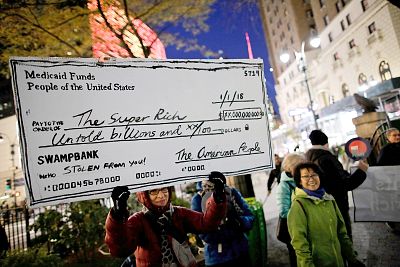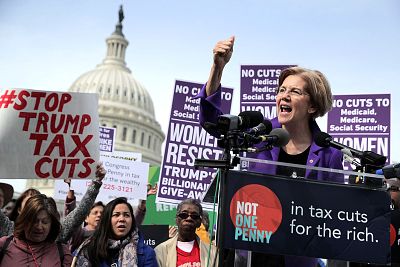The push to take more from the wealthy is becoming a defining feature of the early presidential contest.
WASHINGTON — Setting up a general election contrast with President Donald Trump, Democrats are one-upping one another with proposals to impose new and higher taxes on millionaires, billionaires, their investments and their heirs.
The push to tax the rich any way they can is fast becoming a defining feature of the progressive landscape as the 2020 campaign gets under way.
Sen. Elizabeth Warren, D-Mass., wants "ultra-millionaires" to pay a 2 percent annual tax on assets over $50 million. Sen. Bernie Sanders, I-Vt., who is weighing another presidential run, is calling for new estate tax rates as high as 77 percent on billion-dollar-plus inheritances. Both proposals came not long after Rep. Alexandria Ocasio-Cortez, D-N.Y., called for a 70 percent tax rate on income over $10 million.
Other plans were already floating around the Democratic primary field before last month and it's likely more will follow. Sen. Cory Booker, D-N.J., wants higher estate taxes to finance a "baby bond" for every child. Sen. Kirsten Gillibrand, D-N.Y., and Sanders have teamed up on a bill to tax financial transactions, a concept Sen. Kamala Harris, D-Calif., also says she supports.
"Taxing the rich has probably been the most popular Democratic policy as long as I've been looking at Democratic polling," Jon Favreau, a former speechwriter for President Barack Obama, told NBC news.
While Democrats have long called for higher taxes on the well-off, activists and party leaders say a variety of overlapping political and economic trends have lent the issue more urgency and produced more far-reaching proposals.
1. The 'new populism'
Part of the renewed emphasis on taxes is an attempt to regain the populist high ground from Trump, a billionaire who campaigned on boasts he would raise his own tax bill, only to pass a $1.9 trillion tax cut tilted toward high earners.
Within the Democratic Party's left wing, many see Trump's presidency as an opportunity to turn the clock back to a time before President Ronald Reagan's popular small-government pitch put Democratic leaders on the defensive over taxes. As politicians like Warren and Sanders often note, the top income tax rate was at least 70 percent until the 1980s and even hit 94 percent during World War II.
"We started bargaining against ourselves, and I think it created a fear of being bold and a fear of being definitive," New York City Mayor Bill de Blasio, who has urged Democrats to make taxing the rich a political focus, told NBC News. "Then you fast forward all the way up to 2016, and a whole lot of voters — people who have been (Democratic) voters throughout their lives — couldn't even recognize their party."
Democrats see potential upside in their message. Polling by Gallup has consistently shownvoters don't think the rich and corporations pay enough in taxes. Early polls this year have found majority support — including from a substantial number of Republicans — for Warren's wealth tax. (The results are more mixed on Ocasio-Cortez's 70 percent proposal.)
Trump, hoping to win back voters who abandoned the GOPin the midterm election last year, has hammered the tax proposals as part of his broader argument that Democrats have become too radical.
"You know, it's interesting. I've been watching our opponents, our future opponents, talk about 70 percent," Trump told reporters last month. "What happens is you really have to study what's happened to Venezuela. It's a very, very sad situation."
2. Big ideas, big price tags
With Democrats in a credible position to gain a governing majority in 2020 and moving to the left, along with Republicans throwing deficit concerns to the wind under Trump, the new tax proposals are viewed as more than just campaign PR. They could actually become law.
"There is a sense that it's important to have very concrete proposals that could be implemented in 2021 if the Democrats win the White House and Congress," said University of California-Berkeley professor Gabriel Zucman, an economist specializing in inequality whom both Warren and Sanders cited in announcing their tax plans.
Democrats are looking for new sources of revenue to finance increasingly ambitious progressive goals, from universal health care to free college to a Green New Deal, and taxes on the wealthy tend to be the most politically palatable option.
Michael S. Linden, a fellow at the progressive Roosevelt Institute, estimates that raising the effective tax rates on the top 0.1 percent of earners by 15 percent, the top 1 percent by 10 percent and the top 5 percent by 5 percent, could raise about $5 trillion combined.
While taxes on the rich alone couldn't offset single-payer "Medicare for All," which some estimates suggest would add $32 trillion in federal spending over 10 years, they could finance a variety of other high-profile Democratic agenda items.
"If you put Medicare for All to one side, you can start talking about all the other proposals: debt-free college; free college for all; a child-care program; massive infrastructure investment; paid family leave," Linden said.
Brian Riedl, an economist at the Manhattan Institute who has advised Republicans, argues that while it's "mathematically possible" to raise several trillion dollars from higher income households alone, he's skeptical that either Warren's wealth tax or a new 70 percent tax rate could hit their revenue goals. That's because they'd likely cause the rich to change their behavior to avoid the tax.
"Wealthy people would start putting their money where it can minimize taxes instead of where it can finance investments and economic growth," he said.
3. Taking on the billionaires
To some advocates for higher tax rates on the rich, raising revenue isn't the only point, it's also about changing how the 1 percent behave.
By imposing steeper top tax rates, they argue, companies will have less incentive to lavish executives with higher and higher salaries, potentially reducing inequality even if the shift means less tax revenue.
This gets into one way the tax debate around the 2020 campaign has sharpened compared to prior election cycles.
Especially among more left-leaning lawmakers, the argument isn't just that billionaires need to pay more taxes in order to finance Democratic programs. It's that the proliferation of billionaires is a threat in and of itself — and that knocking them down a peg would be a public good.
The more that wealth becomes concentrated in the hands of a few, they say, the more that the ultra-rich will muscle aside competition, secure gains through government policy, stymie efforts to undo their influence and then pass the same power to their children.
"The consequence of having amassed that much wealth is bad for our economy," Warren said in an interview explaining her wealth tax on MSNBC's "All In" last month. Warren said that having a small group of people making decisions that always tend to favor a lot of big corporations is bad for democracy, because it means "a democracy that is influenced by the wealthy, the well-connected and is not working for the people."
Warren has tangled early on with Michael Bloomberg and Howard Schultz, two billionaires weighing self-funded runs for president who have been critical of Democratic proposals to tax the rich. Schultz cited Ocasio-Cortez's call for a 70 percent tax in explaining why, if he runs, it won't be as a Democrat.
In this sense, Democratic rhetoric and policies may be coming into alignment with another era in which rapid technological change created a surge in wealth and inequality and prompted an eventual voter backlash to go with it: the Gilded Age of the late 1800s.
The populist and progressive movements that emerged in that era came in response to the rise of powerful billionaires like Andrew Carnegie and Cornelius Vanderbilt and invoked fears that too much wealth would lead to an immovable ruling class. One popular 19th century reformer, Henry George, even proposed a land tax in response.
"The big question was whether you can have a functioning democracy when you have a small number of people with staggering loads of wealth," Edward T. O'Donnell, a history professor at the College of the Holy Cross, said in an interview. "The fear of a rising aristocracy within a democracy was quite real."
The Gilded Age eventually resulted in a burst of progressive legislation in the 20th century, including new federal income taxes and estate taxes, but it took decades to get there, with many failed political campaigns along the way that did not win popular support. Now, some in the 2020 presidential field are hoping history repeats itself and a little bit faster.













